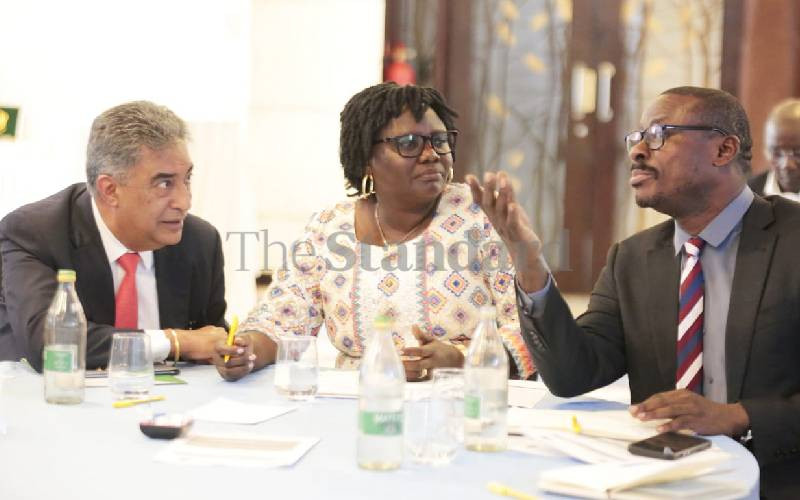The private sector has urged the East African Community (EAC) member states to honour commitments and remove barriers hindering cross-border trade.
According to the East African Business Council (EABC), intra-EAC has stagnated at less than 15 per cent for over 25 years now.
“For the region to attain intra-EAC trade of 40 per cent of total trade by 2030, the private sector urges EAC Partner States to fully implement the Single Customs Territory (SCT) framework, expedite tax harmonisation,” said EABC acting chief executive Adrian Njau.
“They should remove discriminatory fiscal measures on EAC-originating goods by treating them as domestic transfers rather than imports or exports and fast-track the legal process of amending the EAC NTB Act and its regulations.”
Follow The Standard
channel
on WhatsApp
Speaking at a two-day EABC CEO–EAC Secretariat consultative meeting in Nairobi, EABC Acting Chief Executive Adrian Njau urged the full implementation of the Single Customs Territory (SCT) framework, expedited tax harmonisation, and the treatment of EAC-originating goods as domestic transfers rather than imports or exports.
He also called for swift amendments to the EAC Non-Tariff Barriers (NTB) Act and its regulations to achieve the ambitious target of 40 per cent intra-EAC trade by 2030.
Organised by the EABC, Kenya Private Sector Alliance (KEPSA), Kenya Association of Manufacturers (KAM), and supported by GIZ and the EAC Secretariat, the meeting convened 55 representatives from Kenya’s public and private sectors.
Discussions focused on overcoming trade and investment barriers to enhance regional integration. The event also unveiled the East African Business and Investment Summit and Expo, scheduled for October 16–17, 2025, at Nairobi’s Safari Park Hotel, sponsored by the East African Development Bank (EADB) and GIZ.
Njau highlighted that intra-EAC trade grew by 9.3 per cent to $15.2 billion (Sh1.96 trillion) in 2024, while the EAC’s total trade with the world increased by 14.17 per cent to $124.9 billion (Sh16.11 trillion), up from $109.4 billion (Sh14.11 trillion) in 2023.
EAC exports rose sharply by 24 per cent to $55 billion (Sh7.10 trillion), and imports grew by 6.83 per cent to $69.9 billion (Sh9.02 trillion).
However, intra-EAC trade accounted for only 10.8 per cent of total trade, compared to 89.2 per cent with the rest of the world, underscoring the need for a stronger private sector to drive evidence-based advocacy.
Follow The Standard
channel
on WhatsApp
The private sector has urged the East African Community (EAC) member states to honour commitments and remove barriers hindering cross-border trade.
According to the East African Business Council (EABC), intra-EAC has stagnated at less than 15 per cent for over 25 years now.
“For the region to attain
intra-EAC trade
of 40 per cent of total trade by 2030, the private sector urges EAC Partner States to fully implement the Single Customs Territory (SCT) framework, expedite tax harmonisation,” said EABC acting chief executive Adrian Njau.
“They should remove discriminatory fiscal measures on EAC-originating goods by treating them as domestic transfers rather than imports or exports and fast-track the legal process of amending the EAC NTB Act and its regulations.”
Follow The Standard
channel
on WhatsApp
Speaking at a two-day EABC CEO–EAC Secretariat consultative meeting in Nairobi, EABC Acting Chief Executive Adrian Njau urged the full implementation of the Single Customs Territory (SCT) framework, expedited tax harmonisation, and the treatment of EAC-originating goods as domestic transfers rather than imports or exports.
He also called for swift amendments to the EAC Non-Tariff Barriers (NTB) Act and its regulations to achieve
the ambitious target
of 40 per cent intra-EAC trade by 2030.
Organised by the EABC, Kenya Private Sector Alliance (KEPSA), Kenya Association of Manufacturers (KAM), and supported by GIZ and the EAC Secretariat, the meeting convened 55 representatives from Kenya’s public and private sectors.
Discussions focused on overcoming trade and investment barriers to enhance regional integration. The event also unveiled the East African Business and Investment Summit and Expo, scheduled for October 16–17, 2025, at Nairobi’s Safari Park Hotel, sponsored by the East African Development Bank (EADB) and GIZ.
Njau highlighted that intra-EAC trade grew by 9.3 per cent to $15.2 billion (Sh1.96 trillion) in 2024, while the EAC’s total trade with the world increased by 14.17 per cent to $124.9 billion (Sh16.11 trillion), up from $109.4 billion (Sh14.11 trillion) in 2023.
EAC exports rose sharply by 24 per cent to $55 billion (Sh7.10 trillion), and imports grew by 6.83 per cent to $69.9 billion (Sh9.02 trillion).
However, intra-EAC trade accounted for only 10.8 per cent of total trade, compared to 89.2 per cent with the rest of the world, underscoring the need for a stronger private sector to drive evidence-based advocacy.
Follow The Standard
channel
on WhatsApp
By James Wanzala
